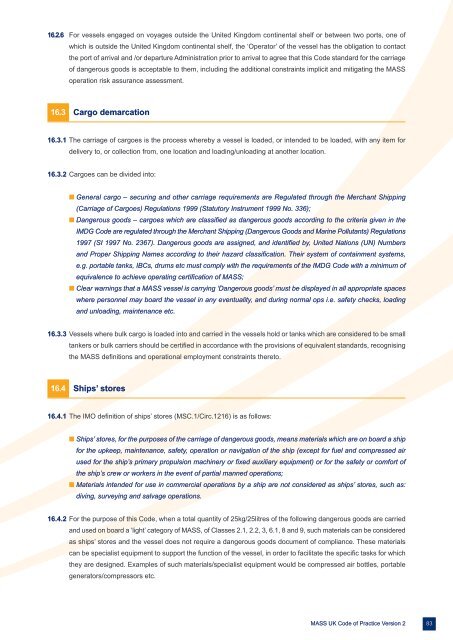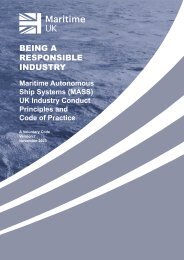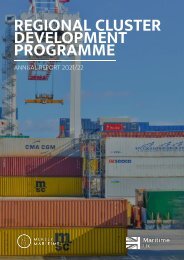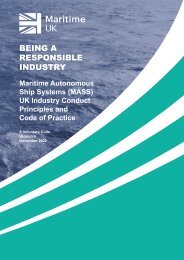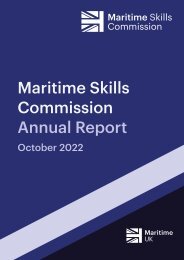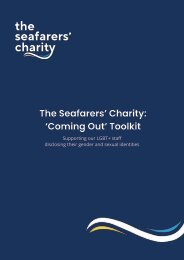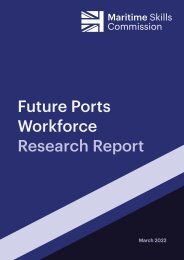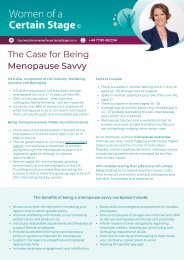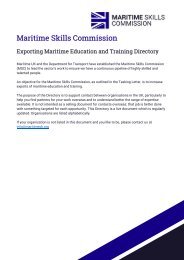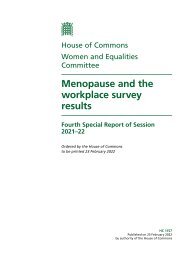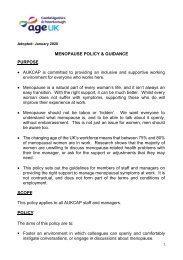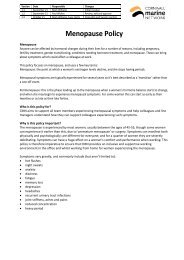Maritime UK MASS CoP v2
Create successful ePaper yourself
Turn your PDF publications into a flip-book with our unique Google optimized e-Paper software.
16.2.6 For vessels engaged on voyages outside the United Kingdom continental shelf or between two ports, one of<br />
which is outside the United Kingdom continental shelf, the ‘Operator’ of the vessel has the obligation to contact<br />
the port of arrival and /or departure Administration prior to arrival to agree that this Code standard for the carriage<br />
of dangerous goods is acceptable to them, including the additional constraints implicit and mitigating the <strong>MASS</strong><br />
operation risk assurance assessment.<br />
16.3 Cargo demarcation<br />
16.3.1 The carriage of cargoes is the process whereby a vessel is loaded, or intended to be loaded, with any item for<br />
delivery to, or collection from, one location and loading/unloading at another location.<br />
16.3.2 Cargoes can be divided into:<br />
n General cargo – securing and other carriage requirements are Regulated through the Merchant Shipping<br />
(Carriage of Cargoes) Regulations 1999 (Statutory Instrument 1999 No. 336);<br />
n Dangerous goods – cargoes which are classified as dangerous goods according to the criteria given in the<br />
IMDG Code are regulated through the Merchant Shipping (Dangerous Goods and Marine Pollutants) Regulations<br />
1997 (SI 1997 No. 2367). Dangerous goods are assigned, and identified by, United Nations (UN) Numbers<br />
and Proper Shipping Names according to their hazard classification. Their system of containment systems,<br />
e.g. portable tanks, IBCs, drums etc must comply with the requirements of the IMDG Code with a minimum of<br />
equivalence to achieve operating certification of <strong>MASS</strong>;<br />
n Clear warnings that a <strong>MASS</strong> vessel is carrying ‘Dangerous goods’ must be displayed in all appropriate spaces<br />
where personnel may board the vessel in any eventuality, and during normal ops i.e. safety checks, loading<br />
and unloading, maintenance etc.<br />
16.3.3 Vessels where bulk cargo is loaded into and carried in the vessels hold or tanks which are considered to be small<br />
tankers or bulk carriers should be certified in accordance with the provisions of equivalent standards, recognising<br />
the <strong>MASS</strong> definitions and operational employment constraints thereto.<br />
16.4 Ships’ stores<br />
16.4.1 The IMO definition of ships’ stores (MSC.1/Circ.1216) is as follows:<br />
n Ships’ stores, for the purposes of the carriage of dangerous goods, means materials which are on board a ship<br />
for the upkeep, maintenance, safety, operation or navigation of the ship (except for fuel and compressed air<br />
used for the ship’s primary propulsion machinery or fixed auxiliary equipment) or for the safety or comfort of<br />
the ship’s crew or workers in the event of partial manned operations;<br />
n Materials intended for use in commercial operations by a ship are not considered as ships’ stores, such as:<br />
diving, surveying and salvage operations.<br />
16.4.2 For the purpose of this Code, when a total quantity of 25kg/25litres of the following dangerous goods are carried<br />
and used on board a ‘light’ category of <strong>MASS</strong>, of Classes 2.1, 2.2, 3, 6.1, 8 and 9, such materials can be considered<br />
as ships’ stores and the vessel does not require a dangerous goods document of compliance. These materials<br />
can be specialist equipment to support the function of the vessel, in order to facilitate the specific tasks for which<br />
they are designed. Examples of such materials/specialist equipment would be compressed air bottles, portable<br />
generators/compressors etc.<br />
<strong>MASS</strong> <strong>UK</strong> Code of Practice Version 2 83


